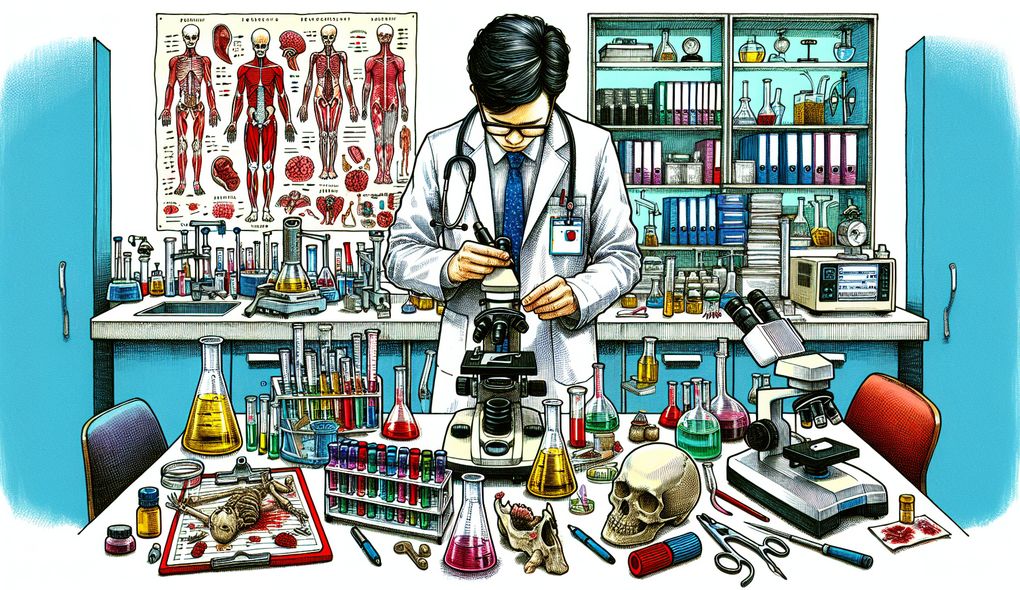Describe your approach to training and mentoring junior pathologists and forensic personnel.
SENIOR LEVEL

Sample answer to the question:
When it comes to training and mentoring junior pathologists and forensic personnel, I take a hands-on approach. I believe in leading by example, so I make sure to demonstrate best practices and techniques in autopsies and post-mortem examinations. I provide guidance and support to junior team members, helping them develop their skills and knowledge in forensic pathology. I also encourage them to ask questions and seek clarification whenever needed. Additionally, I organize regular training sessions and workshops to ensure that everyone is up-to-date with the latest advancements in the field. By fostering a collaborative and supportive environment, I aim to empower junior pathologists to excel in their roles.
Here is a more solid answer:
In my role as a senior forensic pathologist, I have extensively trained and mentored junior pathologists and forensic personnel. I adopt a personalized approach, tailoring my guidance to each individual's strengths and areas for improvement. I start by assessing their existing knowledge and skills, and then create a structured development plan to address any gaps. I provide hands-on training during autopsies and post-mortem examinations, showing them proper techniques and emphasizing attention to detail. I actively involve them in casework discussions, encouraging critical thinking and analysis. Additionally, I organize regular case review meetings where we discuss complex cases and share insights. To foster teamwork, I encourage collaboration and open communication, ensuring that junior team members feel supported. Moreover, I stay updated with the latest research and advancements in forensic pathology, and regularly share relevant articles and resources with the team. I believe in leading by example and strive to create a positive learning environment for junior personnel.
Why is this a more solid answer?
The solid answer provides specific details about the candidate's approach to training and mentoring, including their assessment process, tailored development plans, hands-on training, case review meetings, and continuous learning initiatives. However, it could benefit from more examples of the candidate's accomplishments in mentoring junior personnel.
An example of a exceptional answer:
As a highly experienced and accomplished forensic pathologist, I have successfully trained and mentored numerous junior pathologists and forensic personnel. I foster an environment of continuous learning and growth, starting with a comprehensive orientation program for new team members. This program covers not only technical skills but also the importance of integrity, professionalism, and adherence to ethical standards. To ensure ongoing development, I establish individual mentoring relationships and conduct regular feedback sessions. I provide constructive feedback, celebrating strengths and identifying areas for improvement. I have also implemented a shadowing program, where junior pathologists have the opportunity to observe and learn from experienced colleagues during complex autopsies and court testimonies. Additionally, I promote research and scholarly activities among junior personnel, encouraging them to contribute to the field through publications and presentations. By investing in their professional growth, I have seen many of my mentees advance their careers and achieve significant milestones in forensic pathology.
Why is this an exceptional answer?
The exceptional answer showcases the candidate's extensive experience and accomplishments in training and mentoring junior personnel. It highlights their approach to continuous learning, comprehensive orientation, individual mentoring, feedback sessions, shadowing program, and focus on research and scholarly activities. The answer demonstrates a strong commitment to the professional growth of junior pathologists and forensic personnel.
How to prepare for this question:
- Reflect on your past experience in training and mentoring junior personnel. Think about specific examples of successful mentorship relationships and the outcomes achieved.
- Research the latest advancements and best practices in forensic pathology. Stay updated with new techniques and technologies that can be incorporated into your training approach.
- Consider the importance of fostering a positive and inclusive learning environment. Think about strategies to encourage open communication, collaboration, and teamwork among junior team members.
- Prepare to discuss your approach to providing constructive feedback and helping junior personnel identify and improve upon areas for growth.
- Be ready to share examples of how you have promoted research and scholarly activities among junior personnel, such as encouraging publications and presentations.
What are interviewers evaluating with this question?
- Leadership
- Training and Mentoring
- Teamwork
- Continuous Learning

